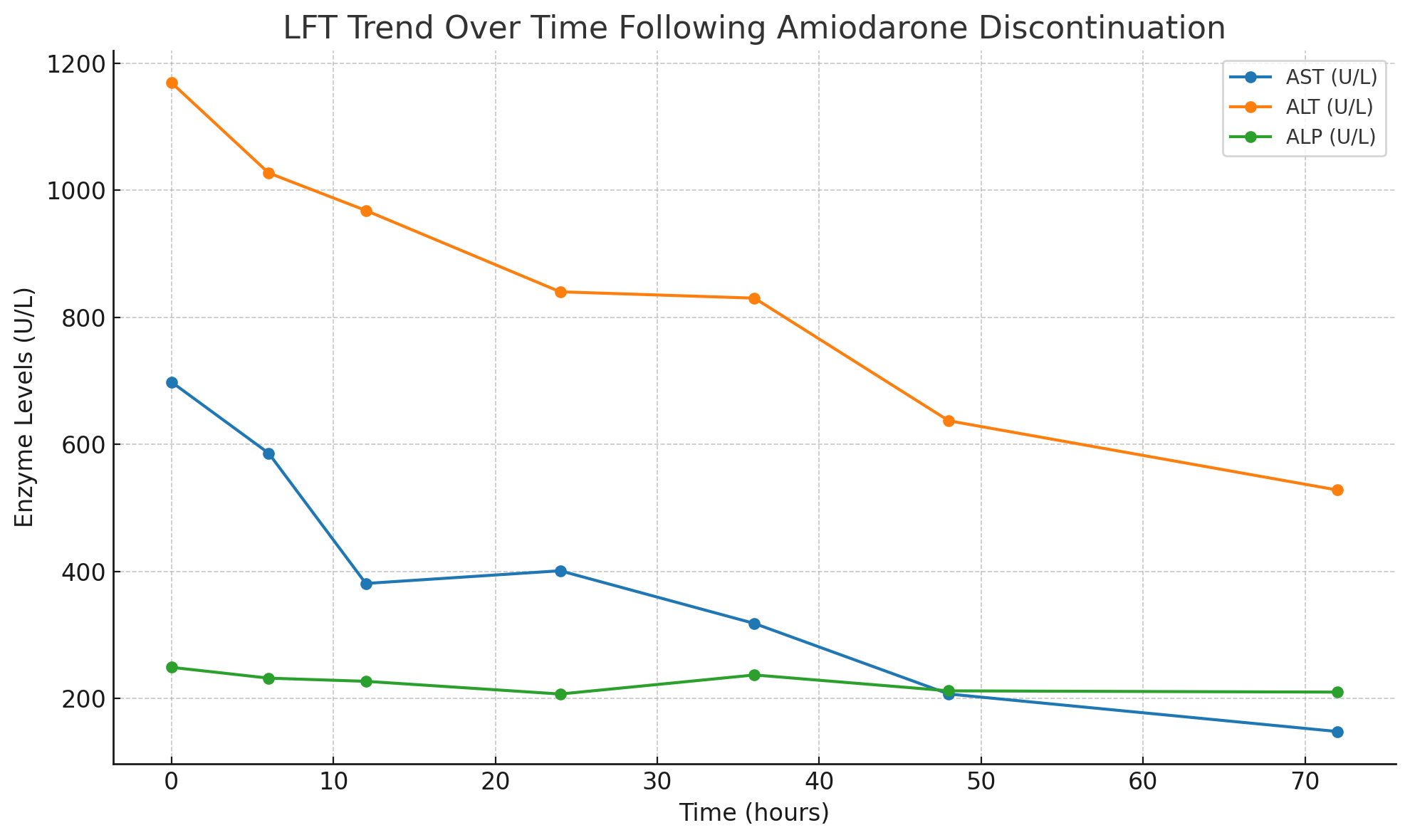Tuesday Poster Session
Category: Liver
P6009 - Missed in Translation: Preventable Hepatotoxicity From Amiodarone Overdose in a LEP Patient
Tuesday, October 28, 2025
10:30 AM - 4:00 PM PDT
Location: Exhibit Hall

Prince Shah-Riar, MD (he/him/his)
DHR Health, Edinburg, Tx
Edinburg, TX
Presenting Author(s)
Prince Shah-Riar, MD1, Rama Bakie, MD2, Rishika Trivedi, MD2, Asif Zamir, MD, FACG3
1DHR Health, Edinburg, Tx, McAllen, TX; 2DHR Health, McAllen, TX; 3DHR Health Gastroenterology, Edinburg, TX
Introduction: Language barriers in healthcare pose a well-documented threat to patient safety, particularly among individuals with limited English proficiency (LEP). These barriers contribute to miscommunication, treatment nonadherence, and a higher incidence of medication errors. This case highlights a serious, preventable instance of drug-induced liver injury secondary to chronic amiodarone overdose in an LEP patient.
Case Description/
Methods: A 44-year-old male with a history of ventricular arrhythmias and AICD placement presented with fatigue, abdominal discomfort, nausea, and fever of one-month duration. The patient, whose primary language is Hakha Chin, misunderstood his amiodarone prescription and ingested 1600 mg/day—quadruple the intended dose of 400 mg/day—due to lack of interpreter support.
Initial laboratory tests revealed marked transaminitis (ALT 1140 U/L, AST 715 U/L) with preserved bilirubin, INR, and renal function. Imaging (CT abdomen, liver Doppler, MRCP) excluded biliary obstruction or structural liver disease. Influenza A (2009 H1) was detected but without respiratory symptoms. The patient was managed supportively, amiodarone was discontinued, and liver enzymes gradually normalized over five days .
Discussion: Amiodarone is associated with dose-dependent hepatotoxicity, particularly at chronic doses >400 mg/day. In this case, the overdose occurred due to inadequate communication in a high-risk LEP patient. Concomitant atorvastatin likely compounded hepatic stress. While influenza may have played a role, the temporal association and resolution upon drug discontinuation confirm drug-induced injury. This case underscores the clinical consequences of unaddressed language barriers and highlights the need for professional interpreter use and multilingual medication education in patients prescribed high-risk therapies.
This case illustrates how communication failure in LEP patients can lead to life-threatening drug toxicity. Ensuring access to certified interpreters, visual medication guides, and structured patient education is essential to reducing preventable harm and improving medication safety in diverse patient populations.

Figure: LFT Trend Following Amiodarone Overdose Due to Language-Related Medication Error
Disclosures:
Prince Shah-Riar indicated no relevant financial relationships.
Rama Bakie indicated no relevant financial relationships.
Rishika Trivedi indicated no relevant financial relationships.
Asif Zamir indicated no relevant financial relationships.
Prince Shah-Riar, MD1, Rama Bakie, MD2, Rishika Trivedi, MD2, Asif Zamir, MD, FACG3. P6009 - Missed in Translation: Preventable Hepatotoxicity From Amiodarone Overdose in a LEP Patient, ACG 2025 Annual Scientific Meeting Abstracts. Phoenix, AZ: American College of Gastroenterology.
1DHR Health, Edinburg, Tx, McAllen, TX; 2DHR Health, McAllen, TX; 3DHR Health Gastroenterology, Edinburg, TX
Introduction: Language barriers in healthcare pose a well-documented threat to patient safety, particularly among individuals with limited English proficiency (LEP). These barriers contribute to miscommunication, treatment nonadherence, and a higher incidence of medication errors. This case highlights a serious, preventable instance of drug-induced liver injury secondary to chronic amiodarone overdose in an LEP patient.
Case Description/
Methods: A 44-year-old male with a history of ventricular arrhythmias and AICD placement presented with fatigue, abdominal discomfort, nausea, and fever of one-month duration. The patient, whose primary language is Hakha Chin, misunderstood his amiodarone prescription and ingested 1600 mg/day—quadruple the intended dose of 400 mg/day—due to lack of interpreter support.
Initial laboratory tests revealed marked transaminitis (ALT 1140 U/L, AST 715 U/L) with preserved bilirubin, INR, and renal function. Imaging (CT abdomen, liver Doppler, MRCP) excluded biliary obstruction or structural liver disease. Influenza A (2009 H1) was detected but without respiratory symptoms. The patient was managed supportively, amiodarone was discontinued, and liver enzymes gradually normalized over five days .
Discussion: Amiodarone is associated with dose-dependent hepatotoxicity, particularly at chronic doses >400 mg/day. In this case, the overdose occurred due to inadequate communication in a high-risk LEP patient. Concomitant atorvastatin likely compounded hepatic stress. While influenza may have played a role, the temporal association and resolution upon drug discontinuation confirm drug-induced injury. This case underscores the clinical consequences of unaddressed language barriers and highlights the need for professional interpreter use and multilingual medication education in patients prescribed high-risk therapies.
This case illustrates how communication failure in LEP patients can lead to life-threatening drug toxicity. Ensuring access to certified interpreters, visual medication guides, and structured patient education is essential to reducing preventable harm and improving medication safety in diverse patient populations.

Figure: LFT Trend Following Amiodarone Overdose Due to Language-Related Medication Error
Disclosures:
Prince Shah-Riar indicated no relevant financial relationships.
Rama Bakie indicated no relevant financial relationships.
Rishika Trivedi indicated no relevant financial relationships.
Asif Zamir indicated no relevant financial relationships.
Prince Shah-Riar, MD1, Rama Bakie, MD2, Rishika Trivedi, MD2, Asif Zamir, MD, FACG3. P6009 - Missed in Translation: Preventable Hepatotoxicity From Amiodarone Overdose in a LEP Patient, ACG 2025 Annual Scientific Meeting Abstracts. Phoenix, AZ: American College of Gastroenterology.
